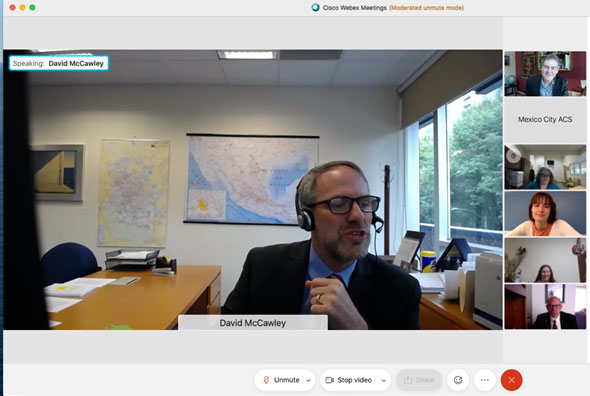Michael Hamburger, a professor in the Department of Earth and Atmospheric Sciences, led a team of 14 IU undergraduate and graduate students, as part of his “Environmental and Energy Diplomacy” class, to produce a series of technical databases, a set of visually engaging StoryMaps, and a detailed report on policy challenges and opportunities related to natural disasters. As a capstone for the class, the team gave a May 6 briefing to a large group of Embassy staff, including the two lead members of the consular team, Minister Counselor for Consular and Consulate Affairs David McCawley and Consul General David Mico.
The students’ work was conducted as part of IU's participation in the Department of State's Diplomacy Lab program. Diplomacy Lab helps the State Department outsource research related to global policy challenges from about thirty leading universities from across the country. The Diplomacy Lab students work as ‘consultants’ with a team of ‘clients’—typically foreign service officers working at a State Department office or embassy. In this case, the team’s client was the Office of U.S. Citizen Services at the U.S. Embassy in Mexico City. Hamburger helped bring the program to IU Bloomington after spending the 2015-16 academic year as a Jefferson Science Fellow at the State Department. IU Bloomington's Diplomacy Lab program is managed by the IU Office of the Vice President for International Affairs.
Reflecting on the IU team’s work, Minister Counselor McCawley wrote, “During our second year collaborating through the State Department’s Diplomacy Lab program, students from Indiana University provided valuable insights on threats facing the estimated 1.6 million U.S. citizens in Mexico. Such threats include natural disasters, the impact of COVID-19, and how sea-level rise and flooding could impact Mexico's tourism industry. The students provided valuable recommendations, maps, and analyses, which will improve our ability to serve U.S. citizens living in and visiting Mexico. At the same time, the students gained practical experience on one of our most important bilateral relationships, and the role of diplomacy in today's interconnected world.”
The 140-page report produced by the IU students includes analysis and policy recommendations on natural disaster vulnerability and potential impacts on U.S. citizens, based upon their analysis of scientific, technical and societal data. The report also highlighted opportunities for U.S. and Mexican cooperation in scientific and technical development as well as areas of potential improvement in the Embassy's response to natural disasters.
In contrast to the previous year’s class, which provided a broad overview of the natural disaster risks facing US citizens in Mexico, this year’s cohort focused on a series of specific challenges in response to the needs of the Embassy counterparts. Working in small teams of 2-4 students, the class provided (1) a review of new demographic data on US citizens living in and visiting Mexico, (2) a study of the new hazards associated with disasters that might occur during a pandemic, (3) a review of communication from the Embassy surrounding disaster risk reduction, (4) a study of the long-term threats associated with sea-level rise along the Mexican coastline, and (5) a study examining scenarios of major earthquakes and their secondary effects that might impact US citizens in Mexico.
The four graduate students and ten undergraduates in the Diplomacy Lab class came from a wide range of disciplines, including the Department of Earth and Atmospheric Sciences, the Environmental & Sustainability Studies program, the O'Neill School of Public and Environmental Affairs, and the Hamilton Lugar School of Global and International Affairs. One of the teams also benefited from the technical expertise of a group of Informatics students from Professor David Wild’s “Data Science in Practice” class.
In addition to the formal report, the team produced a series of interactive maps and “StoryMaps” that provide a visual summary of the teams’ work:
As Mexico prepares for its next hurricane season, it is likely that the materials prepared by the IU team will make their way into the Embassy’s preparedness and response program. And now, after a second year of the successful collaboration, it’s likely that IU will be a regular contributor to disaster risk reduction efforts in Mexico.

 The College of Arts
The College of Arts